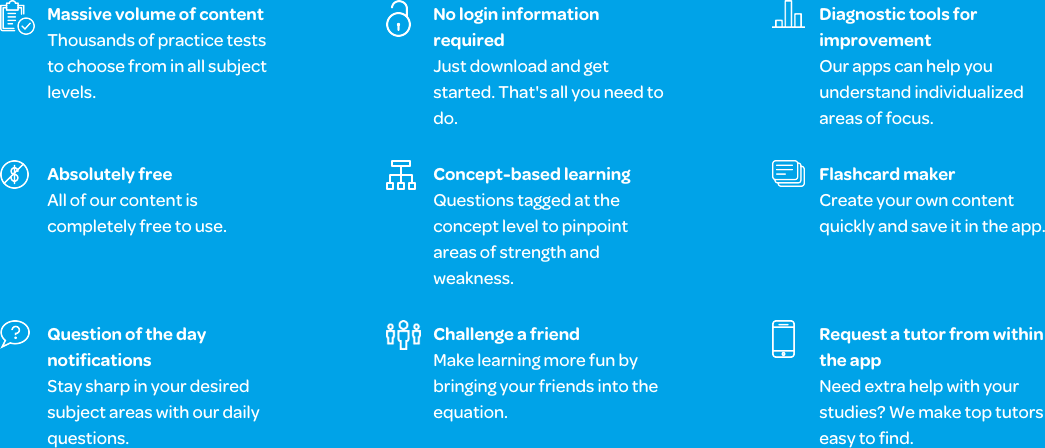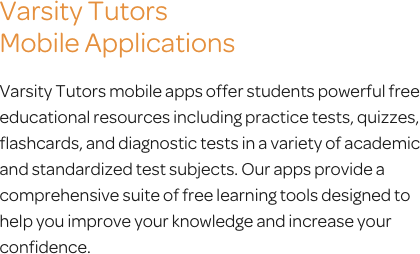The Varsity Tutors ACT Mobile App
The ACT, otherwise known as the American College Test, is used by colleges during the admissions process. It also helps to accurately place incoming students in the proper courses. This test differs from the SAT in that it measures achievement rather than aptitude, and is scored based on the number of questions you answer correctly. The ACT can be taken by students of any age -- even students yet to begin high school. Varsity Tutors’ ACT app comes in handy for students of all ages.
The standard ACT has four sections, and the total testing time is just over four hours. There is also a version of the ACT with an additional writing and grammar section, and students have up to five hours to complete the longer test. Varsity Tutors offers several resources for preparing, including online learning tools and flashcards. When it comes to standardized tests and college entrance exams, it is vital to be prepared. Digital tools such as the ACT app for iPhone, iPad, and Android give you even more opportunities to become familiar with the test’s content.
Depending on how you score on the ACT, colleges may choose to accept your application or not. It can affect eligibility for scholarships as well. Confidence and preparation are essential, because your test score can have a real impact on the path of your academic and professional career. The Varsity Tutors free ACT Prep app for Android, iPhone, and iPad can help prepare you for this important exam.
Study tools in the app include full-length practice exams. You can also focus on sections including ACT English, ACT Reading, ACT Math, or ACT Science. All questions have been written by professionals, and reflect the format of the actual exam. Get confident and skilled enough, and you can aim for a perfect score.
The app also includes flashcards that cover reading, writing, word usage, and grammar. Other sets cover algebra, Earth science, biology, or physics. You can test or time yourself on topics such as quadratic formulas, physics, or clause and conjunction errors. You can even create your own flashcards with audio, video, and text.
The ACT app also includes the Learn by Concept feature. You can take a little time out of your schedule to answer quick practice questions. Even if you’re not ready to go for the full-length practice tests, you can still get in some valuable practice time and use the explanations provided for each answer to study.
The app’s features can help to keep you focused, using questions covering the same topics that are commonly asked on the real test. The app has hundreds of practice questions in English, reading, math, and science to help you to brush up on your knowledge before the exam. These practice exercises are great opportunities to find out what you know and what you don’t. They can also help to prepare you for the ACT’s format, which consists of multiple-choice questions.
With the Varsity Tutors ACT Prep app for Android, iPhone, and iPad, you can have a guide anywhere you take it. Study on the go. Get the app from iTunes or the Google Play Store today.
66 mobile apps to choose from for your tutoring needs.

Learn More
Each year, millions of high school students all over the world take the standardized American College Testing assessment, or ACT. Established in 1959, the test is used to evaluate a student’s academic development at the high school level, and it is also widely used for undergraduate admissions purposes. The ACT is administered six times each year in the U.S. and Canada, and five times a year in other parts of the world.
The ACT consists of four subject-specific, multiple-choice sections: English, Mathematics, Reading, and Science. There is also an optional Writing Test that evaluates your composition skills. Excluding break periods, you have just under three hours to complete the multiple-choice sections. If you choose to take the Writing Test, you will have an additional 40 minutes. Each section on the test is scored on a scale from 1 to 36, and your composite score is the average of your score on the four multiple-choice sections. There are also separate subscores given for each of these sections, which indicate your proficiency level in the section’s subject-specific concepts. The Writing Test is scored separately, and is also scored from 1 to 36.
The first ACT subject test section you’ll encounter is English. The test’s 75 multiple-choice questions assess a variety of English language skills, including grammar, mechanics, style, and organization. The questions are based on five passages, with 15 questions apiece. You will have to work with different types of passages in genres ranging from historic events to personal narratives. Certain sections of each passage are underlined and numbered, and you must select from the provided options to correct each phrase. Other questions ask you to consider the passage as a whole.
The English subject test focuses on your mastery of usage and rhetorical skills. Some of the questions deal with proper punctuation, including commas, semicolons, colons, apostrophes, and hyphens. You will also be tested on your knowledge of grammar and usage issues, like subject-verb agreement, modifying adverbs and adjectives, and erroneous modifiers. You will also answer questions that will test your style and rhetorical skills by asking you to improve a sentence’s structure, or assess a section’s clarity, brevity, or transitions. You will also need to know how to sequence individual sentences within a paragraph, and paragraphs within a passage.
Next, you will face the ACT’s Mathematics section. You are given 60 minutes to answer 60 multiple-choice questions. You will need to use your reasoning and problem-solving skills, and must have a basic working knowledge of pre-algebra, elementary and intermediate algebra, coordinate and plane geometry, and trigonometry. If you would like, you may use a calculator for the entire section, but your device must adhere to the ACT Calculator Policy. None of the problems require the use of a calculator.
The pre-algebra, elementary algebra, and intermediate algebra skills tested range from basic operations to solving equations and the application of formulae. You will need to demonstrate your mastery of numbers in areas such as decimals and fractions, place value, exponents, and approximation. Your evaluation and understanding of algebraic operations will also be tested, as you will be asked to solve equations using variables, factoring, and substitution. Your knowledge of intermediate algebra skills, like the application of the quadratic formula, will be crucial as you move on to questions dealing with quadratic inequalities, sequences and patterns, polynomial roots, complex numbers, and rational and radical expressions.
On the coordinate and plane geometry questions, you will be focusing on graphing, equation-graph relationships, and plane figures in both 2- and 3-D. There will be questions that will ask you to graph inequalities, slope, distance, and perpendicular and parallel lines. Your knowledge of plane figures should include the properties of triangles, circles, rectangles, and other quadrilateral shapes. You must also know how to calculate volume and perform transformations. The section ends with a handful of trigonometry-related questions. These may deal with trigonometric relationships, solving equations, and graphing or modeling functions.
The Mathematics section is followed by the ACT Reading test, which consists of four sets of passage-based questions. You will be provided with one longer passage or two shorter passages in each of four different subject areas: Social Studies, Natural Sciences, Literary Narrative or Prose Fiction, and Humanities. You are given 35 minutes in which to complete 40 multiple-choice questions that will measure your skills in reading comprehension. You will need to demonstrate your understanding of and reasoning behind both explicit and implicit meanings as you work through the questions. You may be asked to make comparisons, explain cause and effect relationships, or use context to determine the meaning of a phrase.
You will finish the ACT with the Science section, which provides you with sets of scientific information that are accompanied by several multiple-choice questions. The Science section is 35 minutes long, and there are a total of 40 questions. You’ll need to have a basic understanding of core science concepts, and you are also expected to have taken a biology, Earth science, or physical science course. Be prepared to interpret data from schematics like graphs and tables, research descriptions, and inconsistent viewpoints. The questions will ask you to explain the features and concepts that relate to the data given. You’ll also be asked to evaluate and draw conclusions, make generalizations and predictions, and extrapolate new information from the provided data.
If you choose to take the optional Writing Test, you will be given 40 minutes in which to respond to a writing prompt. This section gauges your writing skills by asking you to take one of three positions on an issue described by the prompt. It also tests your ability to thoroughly evaluate, analyze, develop, and explain your reasoning. Your organization skills will be tested as well, since you will have to plan, organize, and compose your response within the allotted time.
Though the ACT can seem intimidating, you have been steadily building the knowledge you will need for the test throughout your years in senior high. With diligent study and review, you will be able to draw upon your skills in English, mathematics, reading, and science with confidence.




